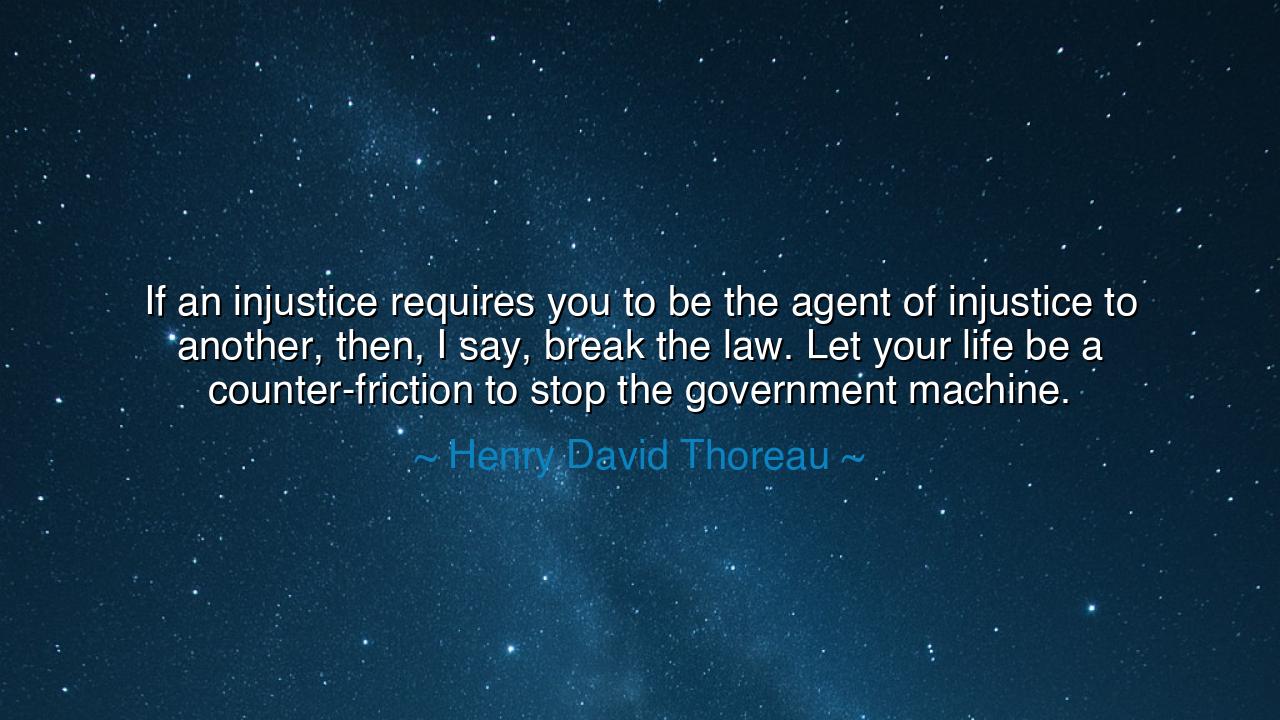
If an injustice requires you to be the agent of injustice to
If an injustice requires you to be the agent of injustice to another, then, I say, break the law. Let your life be a counter-friction to stop the government machine.






The words of Henry David Thoreau, spoken in his defiant hymn to conscience, burn with the fire of moral courage: “If an injustice requires you to be the agent of injustice to another, then, I say, break the law. Let your life be a counter-friction to stop the government machine.” These words are not the cry of a rebel for rebellion’s sake, but the solemn command of a soul unwilling to yield truth to tyranny. Thoreau’s voice rises above time to remind humanity that obedience to conscience is higher than obedience to law, and that when the state demands complicity in evil, the righteous must resist—even if resistance brings suffering.
The meaning of this quote lies in the sacred tension between morality and authority. Thoreau proclaims that when law itself becomes unjust, the duty of the citizen is no longer to comply, but to oppose. Governments, he warns, are machines—cold, efficient, and capable of crushing the innocent if not checked by conscience. A person who silently participates in injustice, whether by paying an unjust tax, enforcing an immoral law, or standing idle before cruelty, becomes a cog in that machinery of oppression. But the man who refuses to cooperate—whose life itself becomes “a counter-friction”—creates a moral resistance so powerful that it can halt the machine, if only for a moment. To live thus is to place righteousness above comfort, and truth above legality.
The origin of these words is found in Thoreau’s essay Civil Disobedience (1849), born from his protest against slavery and the Mexican-American War, which he condemned as an act of conquest. Refusing to pay a poll tax that funded this war, Thoreau was imprisoned. Yet from that jail cell in Concord, Massachusetts, he found a freedom purer than that of those who walked outside. He realized that no prison could confine a conscience that obeys a higher law—the law of justice. Thus, his essay became not only a defense of rebellion but a manifesto for moral independence, inspiring generations who would one day shake empires with peaceful defiance.
History has proven Thoreau’s words prophetic. Mahatma Gandhi, in his struggle against British colonial rule, took Thoreau’s philosophy to heart. By refusing to comply with unjust salt taxes and oppressive laws, Gandhi transformed civil disobedience into a spiritual weapon. Likewise, Martin Luther King Jr., when jailed in Birmingham, echoed Thoreau’s spirit, declaring that “one has a moral responsibility to disobey unjust laws.” Both men, like Thoreau, understood that the greatest service one can offer the state is not blind obedience but righteous resistance—for only by breaking unjust laws can a people remind their government of its humanity.
Thoreau’s wisdom also speaks to a universal human truth: that moral passivity is itself a form of violence. To do nothing in the face of injustice is to feed its strength. The bureaucrat who signs a cruel order, the soldier who obeys an immoral command, or the citizen who remains silent while others suffer—all become, in Thoreau’s words, “agents of injustice.” True virtue, therefore, demands courage—the willingness to stand alone against the tide, to risk censure and persecution for the sake of principle. In every age, those who have done so—Socrates, Joan of Arc, Rosa Parks—have proven that justice advances not through the law itself, but through the conscience of the few who defy it.
Yet Thoreau’s call is not to chaos, but to higher order. He does not urge men to destroy government, but to purify it. The law, he teaches, must serve the soul, not enslave it. When the machinery of power grinds against morality, it is not rebellion but duty to stop it. This act of resistance—peaceful, deliberate, and born of love for truth—is not anarchy but the restoration of justice. For government has no moral authority except that which it derives from the people’s conscience. When that conscience is betrayed, the people must remind it of its purpose through the noblest form of protest: the example of a life lived in truth.
The lesson Thoreau leaves us is timeless: never let your silence or obedience become the weapon of the unjust. When law commands cruelty, choose compassion; when government rewards greed, choose integrity; when the world demands conformity, choose conscience. To “let your life be a counter-friction” is to live with such moral clarity that even a corrupt system cannot make you its instrument. For the true patriot is not he who serves his nation blindly, but he who dares to remind it of its soul.
So let these words endure like a flame passed from age to age: when injustice becomes law, let your life become resistance. Do not fear the solitude of righteousness; it is the fellowship of the brave. Stand firm as Thoreau did, not in anger but in truth. For when one heart dares to defy injustice, the machinery of oppression trembles—and the world, long enslaved to silence, remembers once more the sound of freedom.






AAdministratorAdministrator
Welcome, honored guests. Please leave a comment, we will respond soon